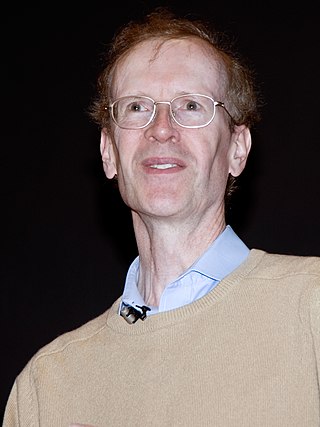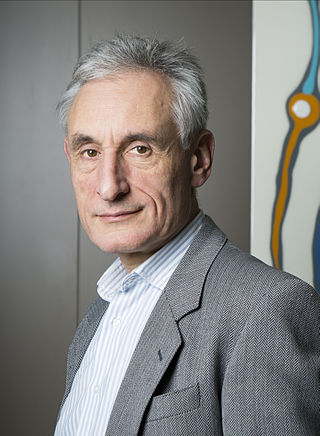Related Research Articles

Sir Andrew John Wiles is an English mathematician and a Royal Society Research Professor at the University of Oxford, specialising in number theory. He is best known for proving Fermat's Last Theorem, for which he was awarded the 2016 Abel Prize and the 2017 Copley Medal by the Royal Society. He was appointed Knight Commander of the Order of the British Empire in 2000, and in 2018, was appointed the first Regius Professor of Mathematics at Oxford. Wiles is also a 1997 MacArthur Fellow.
Dame Frances Mary Ashcroft is a British ion channel physiologist. She is Royal Society GlaxoSmithKline Research Professor at the University Laboratory of Physiology at the University of Oxford. She is a fellow of Trinity College, Oxford, and is a director of the Oxford Centre for Gene Function. Her research group has an international reputation for work on insulin secretion, type II diabetes and neonatal diabetes. Her work with Andrew Hattersley has helped enable children born with diabetes to switch from insulin injections to tablet therapy.

Andrew Blake FREng, FRS, is a British scientist, former laboratory director of Microsoft Research Cambridge and Microsoft Distinguished Scientist, former director of the Alan Turing Institute, Chair of the Samsung AI Centre in Cambridge, honorary professor at the University of Cambridge, Fellow of Clare Hall, Cambridge, and a leading researcher in computer vision.
Henry Keith Moffatt, FRS FRSE is a Scottish mathematician with research interests in the field of fluid dynamics, particularly magnetohydrodynamics and the theory of turbulence. He was Professor of Mathematical Physics at the University of Cambridge from 1980 to 2002.
John Francis Toland FRS FRSE is an Irish mathematician based in the UK. From 2011 to 2016 he served as Director of the Isaac Newton Institute for Mathematical Sciences and N M Rothschild & Sons Professor of Mathematical Sciences at the University of Cambridge.
Martin Thomas Barlow FRS FRSC is a British mathematician who is professor of mathematics at the University of British Columbia in Canada since 1992.
Derek John Fray is a British material scientist, and professor at the University of Cambridge.
Jonathan Alan Hodgkin is a British biochemist, Professor of Genetics at the University of Oxford and an emeritus fellow of Keble College, Oxford.
Philip Candelas, is a British physicist and mathematician. After 20 years at the University of Texas at Austin, he served as Rouse Ball Professor of Mathematics at the University of Oxford until 2020 and is a Fellow of Wadham College, Oxford.
Robert Sinclair MacKay is a British mathematician and professor at the University of Warwick. He researches dynamical systems, the calculus of variations, Hamiltonian dynamics and applications to complex systems in physics, engineering, chemistry, biology and economics.

Steven Andrew Balbus is an American-born astrophysicist who is the Savilian Professor of Astronomy at the University of Oxford and a professorial fellow at New College, Oxford. In 2013, he shared the Shaw Prize for Astronomy with John F. Hawley.
Simon Tavaré is the founding Director of the Herbert and Florence Irving Institute of Cancer Dynamics at Columbia University. Prior to joining Columbia, he was Director of the Cancer Research UK Cambridge Institute, Professor of Cancer Research at the Department of Oncology and Professor in the Department of Applied Mathematics and Theoretical Physics (DAMTP) at the University of Cambridge.

Michael Richard Edward Proctor is a British physicist, mathematician, and academic. He is Professor of Astrophysical Fluid Dynamics at the University of Cambridge and, since his election in 2013, the Provost of King's College, Cambridge and school governor at Eton College.
Andrew Oliver Mungo Wilkie is a clinical geneticist who has been the Nuffield professor of Pathology at the University of Oxford since 2003.

Antony Giuseppe Galione is a British pharmacologist. He is a professor and Wellcome Trust senior investigator in the Department of Pharmacology at the University of Oxford.

David John Wales is a professor of chemical physics in the Department of Chemistry at the University of Cambridge.

Andrew William Woods is BP Professor at the University of Cambridge and a professorial fellow of St John's College, Cambridge.

Andrew John King is a Professor of Neurophysiology and Wellcome Trust Principal Research Fellow in the Department of Physiology, Anatomy and Genetics at the University of Oxford and a Fellow of Merton College, Oxford.

Timothy Peter Softley is Pro-vice-chancellor (PVC) for research and knowledge transfer at the University of Birmingham.
Charles Bangham holds the Chair in Immunology at Imperial College London.
References
- 1 2 3 4 "CRAWFORD, Prof. Andrew Charles" . Who's Who . Vol. 2016 (online Oxford University Press ed.). Oxford: A & C Black.(Subscription or UK public library membership required.)
- ↑ Professor Andrew Crawford, University of Cambridge, retrieved 2016-03-07.
- ↑ "The Fellowship". Trinity College, Cambridge. Archived from the original on 7 March 2016. Retrieved 7 March 2016.
- ↑ Crawford, Andrew Charles (1974). The relationship between spontaneous and evoked release of transmitter substances (PhD thesis). University of Cambridge. OCLC 500412643.
- 1 2 "Andrew Crawford". London: Royal Society. One or more of the preceding sentences may incorporate text from the royalsociety.org website where "all text published under the heading 'Biography' on Fellow profile pages is available under Creative Commons Attribution 4.0 International License." "Royal Society Terms, conditions and policies". Archived from the original on 20 February 2016. Retrieved 9 March 2016.
{{cite web}}: CS1 maint: bot: original URL status unknown (link)